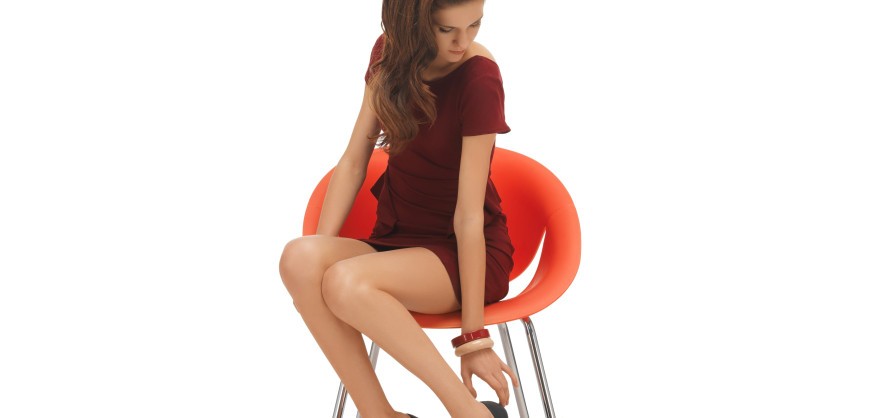“Feminism, post-feminism, ideology!” burst out Emy. “I’ve heard these terms thrown around a million times, but have never really understood what they mean or what significance they have to me! All I can say is that when I look at Julia’s painting I see the very woman that I dreamed I would become.”
“When I was young,” she went on, “I had no doubt that I would grow ever more carefree and beautiful, a graceful, elegant dancer. I never expected that I would end up as an overweight woman, struggling with my figure and an insatiable appetite! You complain about the women’s magazines that promote stick thin models and an impossible image of feminine perfection. They burden us with terrible expectations, and I agree that the pursuit of the ideal figure should not become an end in itself. But I can also assure you that a cumbersome body and the self-pity that accompanies it does not make it easy to feel any kind of satisfaction!”
“Yet surely you agree that these glossy magazines, with page after page of sleek models, brainwash women into believing that their most important task in life is to police the boundaries of their own bodies,” cried Nancy impatiently, as if roused from a lethargy. “And this constant surveillance of our own flesh demands incredible time, mental energy and attention. Mercy! Constantly monitoring our own body becomes the primary goal of our life, and anorexia is celebrated as the ideal of feminine health!”
“Are you trying to argue that Vogue and Vanity Fair and all those other magazines, which have an enormous circulation even in Greece, undermine equality between the sexes and condition us to worship an impossible body image?” demanded Maria. “That they seduce us into buying innumerable beauty products to prove ourselves loyal followers of our self-chosen goddess of physical perfection? And thus we are led, like lambs to the slaughter, to be sacrificed on the altar of an insatiable capitalist economy that commodifies even desire!”
“But of course!” returned Nancy aggressively, swept away by her argument. “Who, after all, profits by this endless talk about the glories of post-feminism and the wonders of rediscovering the sexiness of the female body? The huge multinational industries of clothes, cosmetics, beauty parlors, and fitness centers, that’s who! They are all based on selling an image of feminine perfection, one that will make men swoon with desire and bring women a fulfillment that mere careers, education, and children never can! And thus they betray women and blind them from seeing that their true goal should be the self-affirmation and individuation that they may achieve from their professions, their family, their friends. Instead women pursue the sterile ideals of Sex and the City and the diet regimens, beauty products, and cosmetic surgery that accompany them!”
“You mean the system is actually trying to restore the restrictions of our mothers’ time?”
“She doesn’t mean literally!” responded Athena somewhat impatiently, nonplussed by her friend’s lack of understanding. “We are in no danger of actually becoming like our mothers, dedicated only to our homes and cooking, without an independent life or career. Quite the contrary, since feminism has carved out a place in the workplace for the second sex and capitalism provides the market for our services. But society still doesn’t offer us the opportunities it holds up to men. It sugars the pill by making it easy for us to study and by acknowledging our merits in certain professions. We become a cheap and easily exploited work force.”
“But we’re not truly equal, and the bitterness of this reality can be hidden for only so long. And so post-feminism enters the scene, offering to fill this void through other means. We’re taught to idolize our bodies and buy endless amounts of creams and lotions and beauty products in an impossible quest to stay young. When these fail, we turn in desperation to Botox and acid face scrubs and other forms of cosmetic assistance. Post-feminism teaches women that we are the masters and owners of our own bodies; that we should be the agents in our lives, acting upon our desires and authoring our own identity. But this identity is based upon nothing more than sexual attractiveness! Thus we end up being worse off than when we paid obeisance to our master, man. We actively work to objectify ourselves and commodify our own desires.”
“All this is to say that our generation is wretched,” interposed Kate, both weary and bitter. ”We work endlessly to earn the money to buy the beauty products that we need to stay young and feel of value. But in doing so, we empty all that we are into a job market that doesn’t give women an equal opportunity to compete. We wear ourselves out, we use ourselves up, we consume all our life energy in order to buy a little artificial handsomness , that is paid for with our health and well-being. And worst of all we’re deceived into seeing this as radical freedom, rather than the same old servitude, tricked out in flashy new clothes! That’s what I, with my poor little woman’s brain, gathered from Athena’s and Maria’s words.”
“You may be right,” conceded Athena, “but regardless, I still can’t see myself at home, tied down to the family and household tasks, with no independence or social life outside the home. I need the stimulation of my laboratory and exchanges with my colleagues. I would shrivel up and die if I lost the chance to fulfill my intellectual curiousity and satisfy the creativity that pulses through my veins.”
“Maybe that is true for you,” responded Kate, “but not necessarily for others. Let me tell you something that may surprise you. There have been many times that I have secretly envied our mothers, who devoted themselves to raising their children and who didn’t have to contend with the overwhelming obligations and demands of the workplace. When I was a child, I loved to listen to them gathering together every morning and talking about what to cook for dinner as if their menu was the most important thing in the world! And I often feel guilty when I think of how my own children have returned home from school and found neither meal nor mother waiting for them. I relinquished so much of what I wanted—the chance to see my children grow up—for a salary that gave me nothing more than the illusion that I was independent!“



































